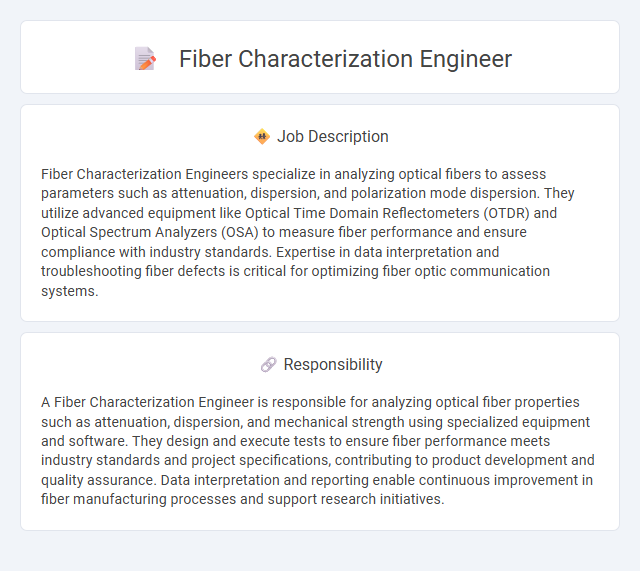
Fiber Characterization Engineers specialize in analyzing optical fibers to assess parameters such as attenuation, dispersion, and polarization mode dispersion. They utilize advanced equipment like Optical Time Domain Reflectometers (OTDR) and Optical Spectrum Analyzers (OSA) to measure fiber performance and ensure compliance with industry standards. Expertise in data interpretation and troubleshooting fiber defects is critical for optimizing fiber optic communication systems.
Individuals with strong analytical skills and a meticulous attention to detail are likely well-suited for a Fiber Characterization Engineer role, as the job typically requires precise measurement and testing of fiber optic materials. Candidates comfortable working in laboratory settings and handling specialized equipment may find the work environment appealing and manageable. Those who prefer routine tasks or less technical work might find the role challenging or less satisfying over time.
Qualification
A Fiber Characterization Engineer typically requires a bachelor's degree in electrical engineering, physics, or materials science, with advanced knowledge in fiber optic technologies. Proficiency in optical testing methods, such as OTDR, interferometry, and spectrum analysis, alongside strong analytical and problem-solving skills, is essential. Experience with fiber optic component fabrication and familiarity with industry standards like ITU and IEC enhance qualification suitability.
Responsibility
A Fiber Characterization Engineer is responsible for analyzing optical fiber properties such as attenuation, dispersion, and mechanical strength using specialized equipment and software. They design and execute tests to ensure fiber performance meets industry standards and project specifications, contributing to product development and quality assurance. Data interpretation and reporting enable continuous improvement in fiber manufacturing processes and support research initiatives.
Benefit
Fiber Characterization Engineer roles likely offer substantial benefits including opportunities for specialized skill development and exposure to cutting-edge fiber optic technologies. Candidates might experience competitive compensation packages and potential access to advanced research tools enhancing their professional growth. The position could also provide a collaborative environment fostering innovation and career advancement prospects within the telecommunications or photonics industries.
Challenge
Fiber Characterization Engineers likely face challenges in accurately measuring and analyzing fiber optic properties under varying environmental conditions. Precise instrumentation and advanced data interpretation techniques may be essential to overcome issues such as signal attenuation and dispersion. Success in this role probably requires continuous adaptation to evolving fiber technologies and industry standards.
Career Advancement
Fiber Characterization Engineers gain expertise in analyzing optical fiber performance using advanced measurement techniques, enabling them to identify defects and optimize signal transmission. Mastery in spectral analysis, polarization measurement, and high-speed data acquisition accelerates career growth toward senior engineering roles or technical consulting positions. Progression often leads to leadership in research and development or specialized roles in telecommunications and photonics industries.
 kuljobs.com
kuljobs.com